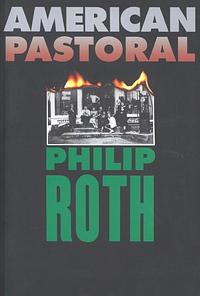Take a photo of a barcode or cover
This book is difficult to read but worth it, mostly I think because the author doesn't try to make any of his characters likable. This is a great book for book groups, as it is best enjoyed after talking about and figuring it out with others. Best also to take time to reflect, and to pay attention to the structure.
I actually think this book is quite brilliant. I love Roth's prose. It's not easy going, you can't rush it, you have to read his sentences word for word, nice and slowly. But once you get into the flow of doing that, it is very enjoyable. One to reflect on for a while. Very interesting storyline and I love the way it was told. My fave from the pile of the books I had to read for uni this period (except for Egan's A Visit from the Goon Squad, but I read that one a year or two ago). Looking forward to more Roth.
I hesitate to say this book was hard work - that's not quite it, rather that it is (like all of Roth's books) very dense, and required for me at least, a very slow read to soak up the side-tracks, the backstories, the characters and their histories. I could really only read it in twenty minute bursts before taking a rest. It's like a rich venison stew - you don't need too much of it in one go, no matter how wonderful it is.
And at first when I got to the end, I turned the page and thought, 'is that it'? It does end very abruptly, but as I thought about it more, I realised how clever Roth had been, because we learn what happens to the Swede and his family at the beginning of the book when Skip meets him for dinner: the three sporty boys, no mention of Merry, and the photo of his wife who clearly isn't Dawn, and the death of his father, Lou.
www.clairefuller.co.uk
Oddly, the next book I picked up is A Head Full of Ghosts, also featuring a Merry. If American Pastoral is a venison stew, then my next book and its Merry is a burger and chips. (Sometimes desired, but eaten fast and forgotten.)
And at first when I got to the end, I turned the page and thought, 'is that it'? It does end very abruptly, but as I thought about it more, I realised how clever Roth had been, because we learn what happens to the Swede and his family at the beginning of the book when Skip meets him for dinner: the three sporty boys, no mention of Merry, and the photo of his wife who clearly isn't Dawn, and the death of his father, Lou.
www.clairefuller.co.uk
Oddly, the next book I picked up is A Head Full of Ghosts, also featuring a Merry. If American Pastoral is a venison stew, then my next book and its Merry is a burger and chips. (Sometimes desired, but eaten fast and forgotten.)
A staggering work. Hilarious but also viciously, consistently heart-rending, almost on a page-by-page basis. At first it's hard to remember that the story is filtered through Zuckerman, given how swiftly the book becomes entangled in Swede's cascading thoughts, stream-of-consciousness internal debates and memories, and rhythmic conversation. Yet it is precisely the distancing effect of Zuckerman that elevates the novel to a masterpiece, forcing the reader to constantly filter the increasingly detailed, personal explication of Swede through the knowledge that this "real" man (actually based, at least in his ideal young version, on a classmate of Roth's) is an extemporaneous creation of the writer, who consistently attempts to yoke the man's nightmarish private life and its fragile, then completely shattered, social balance to his own preconceptions. Through Zuckerman, Swede's good-natured but fundamentally conservative outlook becomes messy, irreconcilable; the satire on misguided, myopically radical youth becomes both the dad's defensiveness and the author's generational clash, calling into question the veracity of some things and the spin on others. This is one of the great books, a neurotic summary of America as an un-summarizable contradiction, impossible to solve and maddening to those who try.
I also never wanted a nice pair of gloves so badly in my whole life.
I also never wanted a nice pair of gloves so badly in my whole life.
Disfruté mucho leyendo este libro. Me gusta la temática, me gustan los personajes. La historia que debería ser un aburrido cuento de hadas pero no.
Sufrí con el protagonista, aunque no puedo empatizar con él. Creo que más bien me hace pensar en mi padre y en sus sueños de "una vida perfecta" y en como las cosas no salen siempre como uno desearía. En la necesidad de estar en constante negación y en aguantar porque "solito todo tendría qué encarrilarse", debería, la vida debería compensarlo. O ese es el profundo deseo (a lo mejor un poco infantil).
Me gustaron las descripciones de los lugares, de la gente. ¡Los guantes! Hasta los cuentos sobre guantes y sobre Miss America.
Yo tenía la impresión de que al final no iba a tener tantas ganas de leer los otros libros de la trilogía, pero sí tengo ganas. También creí que iba a existir un gran cierre para ese último episodio con la cena que me dejara menos ansiosa. Todo lo que pasó fue que solté una risita y pensé "pinche Marcia".
Sufrí con el protagonista, aunque no puedo empatizar con él. Creo que más bien me hace pensar en mi padre y en sus sueños de "una vida perfecta" y en como las cosas no salen siempre como uno desearía. En la necesidad de estar en constante negación y en aguantar porque "solito todo tendría qué encarrilarse", debería, la vida debería compensarlo. O ese es el profundo deseo (a lo mejor un poco infantil).
Me gustaron las descripciones de los lugares, de la gente. ¡Los guantes! Hasta los cuentos sobre guantes y sobre Miss America.
Yo tenía la impresión de que al final no iba a tener tantas ganas de leer los otros libros de la trilogía, pero sí tengo ganas. También creí que iba a existir un gran cierre para ese último episodio con la cena que me dejara menos ansiosa. Todo lo que pasó fue que solté una risita y pensé "pinche Marcia".
challenging
emotional
reflective
slow-paced
Plot or Character Driven:
Character
Strong character development:
Yes
Loveable characters:
Complicated
Diverse cast of characters:
No
Flaws of characters a main focus:
Yes
I know I'm supposed to give this a 4 or 5 star review but it's just 'meh.' Sure, Roth is a great writer. But I only stuck with it because it's on my 100 Essential Novels scratch off poster. Reading this made me feel the same way I felt when watching August Osage County: I'm supposed to like it, as art, but I just don't care about the characters.
I tried to read this to understand my sister better, because she says its one of her favorite novels, but I just could NOT get through it. I read through the first act with my nose scrunched up the whole time. Insufferable.
My first Roth book. Quite the sceptic fo the American Dream. If the image of the perfect American Family is the Saturday Evening Post Thanksgiving Cover by Norman Rockwell, Roth knows how to skewer it. Freedom of want, freedom of worship, freedom from fear and freedom of speech are demonstrated at their most idealized in the Levov family of pastoral New Jersey. FDR was a hero to the family patriarch and those four freedoms bring nothing but pain for his family. This is a thoughtful look at what we envision the end-goal of the efforts of countless immigrants to become the "American" that promise envisions. Be careful what you wish for.
Fun book, I have no clue what Phillip Roth’s political stance is from reading this book. He writes the Swede as like this dopey milquetoast liberal who came up during a time where America was the shit and is juxtaposed by his daughter Merry who’s so progressive even the most annoying Twitter lib would find her cringe. The Swede’s blind faith in American institutions seems so absurd like it must be satirizing of liberals. At the same time, Merry and her gang of leftists are also made out to be the most fucking annoying brain dead people, where like you want to agree with them and their beliefs, but they are cringe and rope innocent people into violence as a means of getting what they believe is right. I feel like based on these two characters, he shows that he thinks both sides are equally ridiculous. The Swede is a dope but Merry did make me want to rip my hair out by the end of the book.






